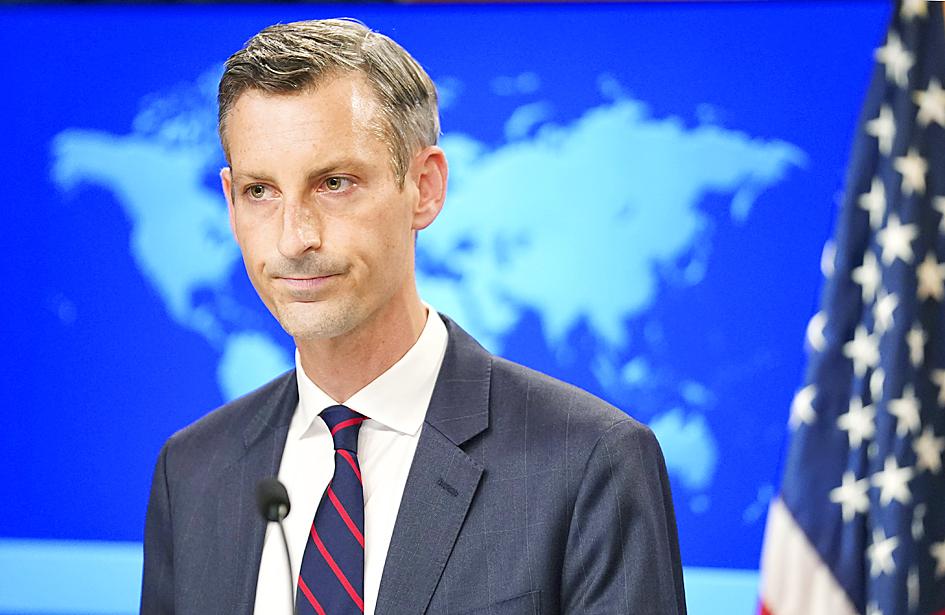The US yesterday called on China to halt its “provocative” pressure on Taiwan after a record number of daily incursions by Chinese warplanes, saying the military actions are destabilizing and risk leading to “miscalculations.”
“The US commitment to Taiwan is rock solid and contributes to the maintenance of peace and stability across the Taiwan Strait and within the region,” US Department of State spokesman Ned Price said in a statement.
The flybys close to Taiwan on Saturday extended a Chinese display of military might as the country entered a second day of celebrations of communist China’s founding.

Photo: AP
The Chinese People’s Liberation Army on Saturday sent 39 military aircraft into Taiwan’s air defense identification zone (ADIZ) and 38 on Friday, the Ministry of Defense wrote on Twitter.
The US “is very concerned by the People’s Republic of China’s provocative military activity near Taiwan, which is destabilizing, risks miscalculations, and undermines regional peace and stability,” Price said. “We urge Beijing to cease its military, diplomatic, and economic pressure and coercion against Taiwan.”
The incursions came as China began to celebrate the 72nd anniversary of the founding of the People’s Republic of China.
Hu Xijin (胡錫進), editor-in-chief of China’s Global Times, said Taiwan should probably expect more similar incidents.
“These warplanes appearing at Taiwan Straits on China’s National Day is a new ceremony of Chinese people to celebrate the holiday,” he wrote on Twitter. “There could be more warplanes appearing there next year on the National Day, if Taiwan authorities continue their provocation.”
The show of force comes after China’s Taiwan Affairs Office issued a denunciation of Minister of Foreign Affairs Joseph Wu (吳釗燮) on its Sina Weibo account.
China derided his efforts to strengthen Taiwan’s international relations as “shrilling and moaning,” and “the buzzing of flies.”
The statement followed Wu’s assertion, in a speech on Monday last week at the Hoover Institution in the US, that Taiwan is under constant threat from China, including gray zone tactics and information security attacks.
China has increased its diplomatic, economic and military pressure on Taiwan over the past year.
The Chinese air force made more than 500 incursions into Taiwan’s ADIZ in the first nine months of this year, compared with more than 300 a year in the past, Minister of National Defense Chiu Kuo-cheng (邱國正) told lawmakers.
Twenty-four PLA aircraft flew into Taiwan’s air defense identification zone a week earlier, one day after Taiwan announced it had requested to join the Comprehensive and Progressive Agreement for Trans-Pacific Partnership.

INVESTIGATION: The case is the latest instance of a DPP figure being implicated in an espionage network accused of allegedly leaking information to Chinese intelligence Democratic Progressive Party (DPP) member Ho Jen-chieh (何仁傑) was detained and held incommunicado yesterday on suspicion of spying for China during his tenure as assistant to then-minister of foreign affairs Joseph Wu (吳釗燮). The Taipei District Prosecutors’ Office said Ho was implicated during its investigation into alleged spying activities by former Presidential Office consultant Wu Shang-yu (吳尚雨). Prosecutors said there is reason to believe Ho breached the National Security Act (國家安全法) by leaking classified Ministry of Foreign Affairs information to Chinese intelligence. Following interrogation, prosecutors petitioned the Taipei District Court to detain Ho, citing concerns over potential collusion or tampering of evidence. The

‘FORM OF PROTEST’: The German Institute Taipei said it was ‘shocked’ to see Nazi symbolism used in connection with political aims as it condemned the incident Sung Chien-liang (宋建樑), who led efforts to recall Democratic Progressive Party (DPP) Legislator Lee Kun-cheng (李坤城), was released on bail of NT$80,000 yesterday amid an outcry over a Nazi armband he wore to questioning the night before. Sung arrived at the New Taipei City District Prosecutors’ Office for questioning in a recall petition forgery case on Tuesday night wearing a red armband bearing a swastika, carrying a copy of Adolf Hitler’s Mein Kampf and giving a Nazi salute. Sung left the building at 1:15am without the armband and apparently covering the book with a coat. This is a serious international scandal and Chinese

Seventy percent of middle and elementary schools now conduct English classes entirely in English, the Ministry of Education said, as it encourages schools nationwide to adopt this practice Minister of Education (MOE) Cheng Ying-yao (鄭英耀) is scheduled to present a report on the government’s bilingual education policy to the Legislative Yuan’s Education and Culture Committee today. The report would outline strategies aimed at expanding access to education, reducing regional disparities and improving talent cultivation. Implementation of bilingual education policies has varied across local governments, occasionally drawing public criticism. For example, some schools have required teachers of non-English subjects to pass English proficiency

PERSONAL DATA: The implicated KMT members allegedly compiled their petitions by copying names from party lists without the consent of the people concerned Judicial authorities searched six locations yesterday and questioned six people, including one elderly Chinese Nationalist Party (KMT) member and five KMT Youth League associates, about alleged signature forgery and fraud relating to their recall efforts against two Democratic Progressive Party (DPP) legislators. After launching a probe into alleged signature forgery and related fraud in the KMT’s recall effort, prosecutors received a number of complaints, including about one petition that had 1,748 signatures of voters whose family members said they had already passed away, and also voters who said they did not approve the use of their name, Taipei Deputy Chief Prosecutor